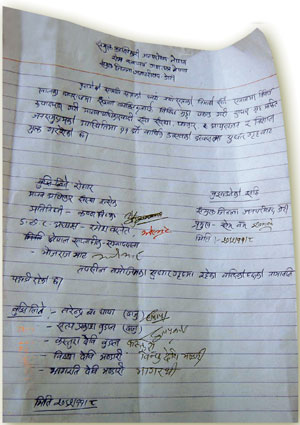|
|
| JUDGE, JURY, HANGMAN: Unqualified 'people's courts' judges try cases of everything, from homicide to 'cultural crimes'. |
The people's court is in considerable demand here, because of their speed, largely because it is seen to set a lower burden of proof. Cases thrown out of districts courts, or lost due to inadequate evidence are all brought to the Maoist courts. Plaintiffs, often poor, take legal battles over property, domestic violence, rape, sexual abuse, bigamy, and other social problems to people's courts.
But equally, people use the Maoist legal option to threaten and intimidate fellow villagers. Verdict on all cases is passed by a single person who does not have a law education or formal legal training, and is often politically motivated. Maoist judges also prefer to try cases related to sympathisers, not unaffiliated civilians.
Chettri, who dropped out of college to join the Maoist movement, disagrees with all of the above. "We provide justice without bias, and our judges are qualified enough due to their 10-year-long involvement in the 'People's War'," he says.
In response to pressure from lawyers and political parties not to interfere in the country's independent and impartial judiciary system, Prachanda recently ordered his cadres to close down the people's courts in the core city areas.
As with many Maoist activities, that will be difficult, since the people's courts are already a fully functional alternative justice system in many rural and some urban areas in this part of the country.
Internally displaced people ,who might want to take advantage of the ceasefire and peace process to return home, will be tried at these courts. But they'll be tried even if they don't return. "We cannot stop local people from asking us to try cases, so even absent people will be tried and sentenced according to our laws,' says Sunil of the Bardiya Jana Sarkar.
Governing for guns
Out in the far-west, since the peace process started the Maoists have taken over the administration and projects of local government bodies. We were told that most of the 'government's activities are aimed at generating revenue to support the PLA'.
Local Maoist offices in rural and core town areas, not DDCs, control everything-business licenses, revenue collection, customs and taxation, development work, transportation, building contracts, river leasing, and much more.
"From 25km west of the district headquarters, we control all areas and this is why we, and not the seven-party government, have the right to govern," says Suman, a senior official Maoist 'people's government' leader in Guleriya.
The development and administration budgets for Bardiya and Banke together are over Rs 21 million annually, and we were told that most of the money will be diverted to strengthen the PLA and its soldiers. The Maoists also control the Rs 1 million local development budgets. They collect custom duties from all but one of the seven Nepal-India border posts in the district, give out bridge and road building contracts, regulate river transport, and collect taxes from vegetable and livestock markets, and forest users.
The message from the local Maoists is clear. "We won't make the same mistake as the Nepali Congress, which led an armed rebellion against King Mahendra and disarmed even before the peace process was completed," says Purna Subedi, head in Nepalganj of the Banke Jana Sarkar. "That would be a huge mistake."



